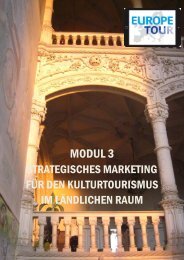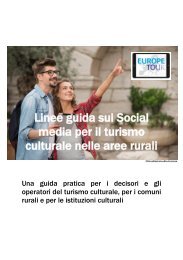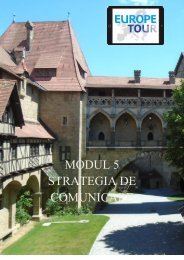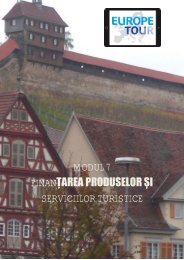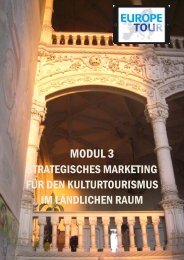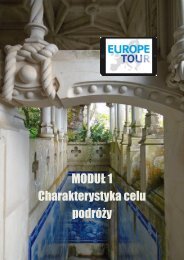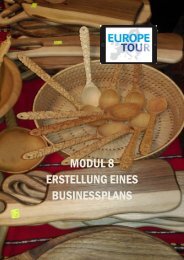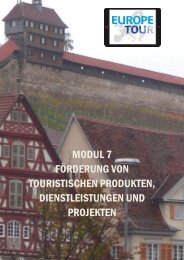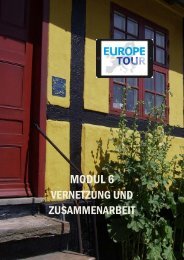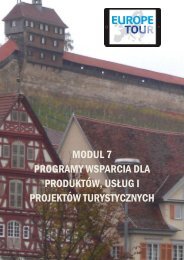Module_0_Introduction_to_Training_Modules
Create successful ePaper yourself
Turn your PDF publications into a flip-book with our unique Google optimized e-Paper software.
CULTURAL TOURISM TRAINING COURSE<br />
MODULE 0 - INTRODUCTION<br />
Let’s start!<br />
Welcome <strong>to</strong> the EUROPETOUR training course! We value your motivation <strong>to</strong> extend your knowledge and<br />
expertise.<br />
You have probably been recommended by someone <strong>to</strong> have a look at the www.Europe<strong>to</strong>ur.tips<br />
webpage. Or you have found it by coincidence. There is a list of ingredients you would need <strong>to</strong> gather<br />
up in order <strong>to</strong> pass the course: It is mainly the curiosity, plenty of motivation <strong>to</strong> read, <strong>to</strong> think, <strong>to</strong><br />
observe and <strong>to</strong> try out new things.<br />
In order <strong>to</strong> make the most of the course, we have collected a few tips and suggestions for your<br />
successful learning process:<br />
Tips for your eyes<br />
• Print the <strong>Module</strong>s and other learning materials and list and browse through them until they get<br />
fingered and thumbed.<br />
• Underline important things using different colours (develop your own system for attribution of<br />
colours <strong>to</strong> diverse text elements)<br />
• Draw schemas and mind maps on posters and place them on the wall in your learning corner<br />
(or at least temporarily on<strong>to</strong> the fridge door or the bathroom door).<br />
Tips for your ears<br />
• If you are in <strong>to</strong>uch with other learners, form a learning group and meet regularly in order <strong>to</strong><br />
learn the lessons step by step. Read aloud <strong>to</strong> each other, explain your point of view and<br />
discuss as much as possible.<br />
• The majority of mobile phones or MP3 players are equipped with a recording <strong>to</strong>ol. Make your<br />
personal record reading through the chapter you have been working on. If you cannot stand<br />
your own voice, ask a friend of yours, or your husband or your children.<br />
• While learning, read your notes aloud. If itś helpful, form a short rhymes or slogans which will<br />
help you <strong>to</strong> memorize the key concepts.<br />
• Find someone who would be interested in the <strong>to</strong>pic and at the end of each unit explain <strong>to</strong><br />
him/her the basics you have learned.<br />
Tips for the rest of your senses<br />
• Try <strong>to</strong> get as complex a picture as possible. Going through the exercises, there will be many<br />
tasks <strong>to</strong> fulfill outdoor. Collect impressions and always involve all of your senses.<br />
• If a particular paragraph in the learning materials rings the bell and reminds you at a real life<br />
situation or an example from your surroundings, link this idea with the text and put down a<br />
clear note.<br />
• Throw an experimental party for a few friends and ask them <strong>to</strong> help you with the exercises.<br />
Try out as many things as possible, including role play which is the best way <strong>to</strong> learn things<br />
intensively. Furthermore, two heads are better than one, and four heads are better than two.<br />
• Link the learning with your daily routine. While shopping do the homework for various lessons.<br />
You do not need <strong>to</strong> organize extra trips <strong>to</strong> fulfil the tasks described in the exercises. There is<br />
8



